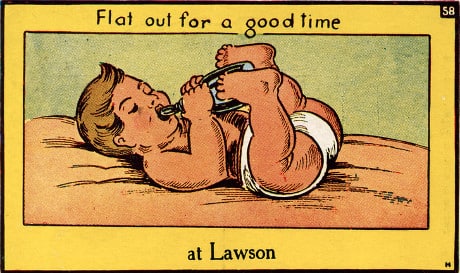
On a list of the the most abused foods in America sugar-sweetened beverages always score among the top entries. James Greenblatt, the chief medical officer of Walden Behavioral Care (treatment centers that concentrate on eating disorders), joins the chorus of voices that define sugar as addictive. Moreover, what was considered a normal portion size of soda in the 1950s — 7 ounces — has grown to a ridiculous 42 ounces.
It doesn’t take an expert to realize that sweets transport kids into an altered state. On a practical level, any parent realizes that a sugar buzz can get kids so hyped up they bounce off the walls. One goal of anti-sugar activists is to stop corporations from advertising sugar-saturated snacks and drinks directly to children, a marketing ploy that is as irresponsible as advertising liquor to alcoholics.
In encouraging their government to enact a tax on sugar, some British obesity experts have used a controversial phrase, calling sugar “the alcohol of childhood.” In the U.S., the widely-recognized authority Dr. Robert Lustig has used the exact same phrase.
Furthering the alcohol analogy, Dr. Yoni Freedhoff says:
[…] The use of sugar as a means to pacify, entertain and reward children has become normalized to the point that questioning our current sugary status quo often inspires anger and outrage. We need to re-relegate sugar to the role of occasional treat rather than its current role of everyday, anytime, crutch.
Does any of that sound familiar? How many times has alcohol been compared to a crutch? How many adults find it impossible to get through the day without liquor? It pacifies, entertains, and rewards adults, as proved by the frequent iteration of such expressions as “You need a drink” and “You deserve a drink” and “Come on, have a drink and unwind.”
In this vein, Simon Capewell, who is a professor of Clinical Epidemiology, has said:
Everywhere, sugary drinks and junk foods are now pressed on unsuspecting parents and children by a cynical industry focussed on profit not health. The obesity epidemic is already generating a huge burden of disease and death.
In a rather disjointed and off-the-cuff fashion, Geoff Canada of Harlem Children’s Zone corroborated the same notion for the Freakonomics podcast:
I have become increasingly convinced, and I’m no scientist, that a lot of this is addictive behavior, that the sugar that folks consume, it is an instant feedback, eating a Twinkie… Lots of families I think are using food, right, because the rest of their lives are so horrible that this is something that you can enjoy…
A poem by Lynne Bronstein begins, “Maybe if I got drunk I could sing, maybe if I got drunk I could swim…” and ends with the line, “Maybe if I had one more drink I could give it up forever.” Although this is a poem studded with adult language that references a different substance, it seems to echo the self delusion suffered by so many food addicts. Maybe if they could just get through this cake and these two pints of ice cream tonight, they could start fresh tomorrow and quit junk food forever.
But for child addicts of fizzy drinks, their intentions are more pure because they don’t even bother to try and fool themselves. They don’t think that far ahead, and have no worries about consequences — they just hope to keep on swilling soda pop forever.
Some kids never have a chance to avoid it, because adults in the environment are either clueless or uncaring. In an online forum, a person known as “tacomalvado” described the behavior of an aunt:
When her daughter was about 7-8 months old and had recently gotten completely weaned from breast milk, they came over for dinner. It was at the end of the meal and she was giving my cousin Squirt soda. She complained that she couldn’t get my cousin to stop drinking soda… She can’t even hold the damn soda can, she only drinks it because you give out to her! My cousin is about 12 now, and last I heard she gained a ton of weight.
Your responses and feedback are welcome!
Source: “6 real culprits that are making American kids fat,” MarketWatch.com, 01/18/15
Source: “Sugar is as dangerous as alcohol and tobacco, warn health experts,” Telegraph.co.uk, 01/09/14
Source: “100 Ways to Fight Obesity: Full Transcript,” Freakonomics.com, 03/27/13
Source: “10 Steps by Lynne Bronstein,” Muse-apprentice-guild.com, 2003
Source: “My mother, the fat logician,” Reddit.com, October 2014
Image by Blue Mountains Local Studies

 FAQs and Media Requests:
FAQs and Media Requests: 











